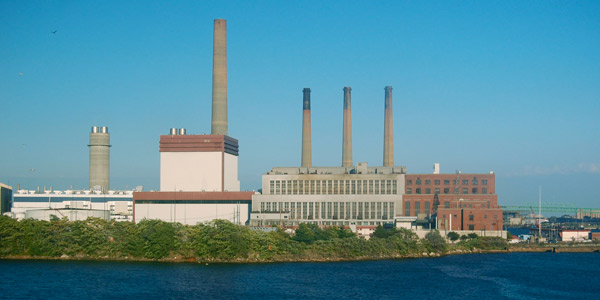By Rory D. Sweeney
FirstEnergy Solutions is looking to recent developments in New England to bolster its renewed argument that FERC take emergency action to financially support “fuel-secure” resources to promote resilience of the nation’s electricity grid.
ISO-NE’s request to prop up Exelon’s Mystic gas-fired plant shows FERC’s “failure … to ensure the continued operation of critical nuclear and coal-fired generators while a long-term solution is developed” when it declined to implement the emergency price supports envisioned by the Department of Energy’s Notice of Proposed Rulemaking earlier this year, FES argued in comments filed on Friday in FERC’s resilience docket (AD18-7).
“On multiple occasions in the past several years, the commission was asked to undertake decisive action to preserve grid resilience but failed to do so,” FES wrote, calling on FERC to implement “the same relief requested by ISO-NE but applied at a level sufficient to protect the resilience of the nation’s electric grid.”
“If the commission acts now to preserve nuclear and coal-fired generators, it will have more options to address resilience problems in the future,” the company said. “These options will not exist if the commission waits years or even months to act.”
‘Things to Come’
FES argued that ISO-NE’s Tariff waiver request to keep Mystic running despite Exelon’s plans to retire the facility (ER18-1509) “foreshadows things to come if the commission does not undertake swift and decisive action to preserve fuel-secure generating resources” and “is the consequence of commission inaction and, particularly, its failure to ensure that RTO/ISO markets contain just and reasonable rules that provide adequate compensation for needed generation.”
ISO-NE’s request inspired a Section 206 complaint from the New England Power Generators Association on the issue (EL18-154), along with dissent from other stakeholders. (See Mystic Waiver Request Spurs Strong Opposition.)
Such individual reliability-must-run agreements “are merely Band-Aids,” and without action “at once and on a national level … the commission soon will face a flood of similar requests … that do nothing to address the underlying problems that necessitate such requests,” FES said.
FES filed for bankruptcy on March 31, just a day after announcing the closure of its three nuclear plants and two days after asking Energy Secretary Rick Perry to issue an emergency order under Section 202c of the Federal Power Act directing PJM to compensate coal-fired and nuclear power plants that have 25 days of on-site fuel. Parent company FirstEnergy has since developed a plan to extricate itself from the woes of its merchant subsidiaries. (See FirstEnergy Announces Mixed Earnings, Plan for FES Bankruptcy.)
FES’ pleas to Perry came less than 90 days after FERC rejected his call for cost-of-service payments to coal and nuclear generators (RM18-1) and opened a new docket (AD18-7) to consider grid resilience. (See DOE NOPR Rejected, ‘Resilience’ Debate Turns to RTOs, States.)
The company’s comments were filed in the new docket — along with the Mystic RMR and NEPGA complaint dockets — calling on FERC to reconsider the company’s proposal in the docket initiated by Perry’s request.
FES frames the current resilience docket as a chance for FERC to rectify past mistakes, laying out what it believes are previous opportunities to address issues the commission missed. They include Maryland’s attempt to subsidize construction of a gas-fired generator in 2009, Ohio’s requests for power purchase agreements in 2016, DOE’s NOPR in 2017 and its 202c emergency relief request.
No Real Markets
The filing also takes on repeated claims by RTOs/ISOs that they have the situation under control.
“ISO-NE’s request represents a breach in the dam. Without immediate and meaningful action on a broad scale, the commission will soon be faced with a flood of requests for waivers. Even that may not even be enough to address the threat to the grid’s resilience if RTOs and ISOs continue to ‘hear no evil, see no evil, speak no evil,’” the company said. “The record also makes clear that the commission can no longer rely on assurances from RTOs and ISOs that ‘all is well’ and that they have the problem in hand.”
The company argues two views that radically diverge from sentiment in much of the industry.
First, even though most electricity outages are caused by disruptions at transmission and distribution facilities, resilience isn’t resolved by adding more redundancy on those networks because “threats to the electric grid’s resilience stem first and foremost from problems with the nation’s fuel supply mix,” the company said. However, the filing doesn’t define the threats.
Second, the company argues that providing supports to nuclear and coal-fired units won’t “blow up” markets because they don’t really exist. The idea “that we have truly efficient markets today, where competition among suppliers actually sets prices” is “fundamentally flawed.”
The company included in its filing a 20-page report done by D.C. law firm Wilkinson Barker Knauer in May that FES said “demonstrates that continued deification of these so-called markets is misplaced.” The paper argues competitive energy markets are “in tatters,” having been “trampled” by out-of-market payments to generators, such as renewable energy credits or RMR contracts.
“An overreliance on natural gas in New England has produced a loss of fuel security and diversity so extreme that the retirement of a single natural gas-fired station that does not rely on pipeline gas will expose ISO-NE’s electric grid to rolling blackouts in the coming years,” FES said, noting that CAISO has recently had to confer RMR contracts on three gas-fired plants. (See FERC Approves CAISO-Calpine RMR Settlements.)




